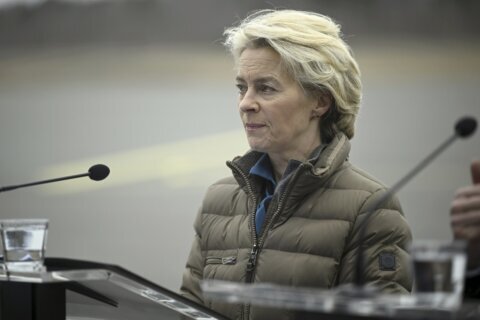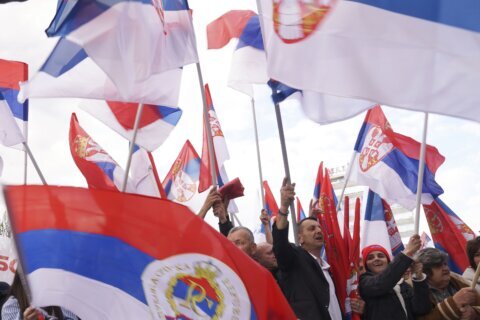BRUSSELS (AP) — French President Emmanuel Macron and Russian leader Vladimir Putin talked on the phone Monday about the need for de-escalating the tensions around the growing migrant pressure on the European Union’s borders with Belarus, Marcon’s office said.
In the almost two-hour talk, they also agreed upon the “need for a humanitarian effort for the migrants” but did not announce any concrete steps, according to the Elysee statement.
The EU says Moscow has a role in building the migration pressure and could actively help in easing it.
The Kremlin’s account of the conversation said Putin informed Macron about his contacts with Belarusian President Alexander Lukashenko and “emphasized the necessity of discussing the problems that had arisen directly between the leaderships of the EU countries and Belarus.”
Putin also noted “the extremely harsh treatment of refugees by Polish border guards,” according to the Kremlin. Polish forces are blocking people from entering Poland and are pushing back to Belarus those migrants who cross the border.
Also Monday, Lukashenko spoke on the phone with Germany’s outgoing Chancellor Angela Merkel for 50 minutes about “the situation with refugees on the Belarusian-Polish, Belarusian-Lithuanian and Belarusian-Latvian borders,” according to Belarusian state news agency Belta.
They discussed “ways and prospects of resolving” the crisis and preventing its escalation, as well as humanitarian aid to the migrants, Belta said.
The calls took place as the EU ratcheted up pressure on Belarus by agreeing to slap sanctions on airlines accused of helping Lukashenko wage a “hybrid attack” against the entire bloc using migrants.
The EU is also calling for humanitarian aid as up to 4,000 migrants are stuck in makeshift camps in freezing weather in Belarus while Poland has reinforced its border with 15,000 soldiers, in addition to border guards and police. The EU has expressed solidarity with Poland’s guarding the bloc’s external border. At least 11 migrants have died in recent weeks.
Polish authorities said Monday that Belarusian services had led a large group of migrants to a border crossing with Poland and made them believe they would be transported by bus to Germany. Polish police broadcast messages across the border telling the migrants that “they have been deceived.”
“The Belarusian side is deliberately escalating the situation,” said Marcin Przydacz, a deputy foreign minister. “The situation is unprecedented and unpredictable.”
Belarus’ borders with Poland, Lithuania and Latvia are also the eastern borders of both the EU and NATO. The EU says Lukashenko’s authoritarian regime has for months invited migrants to the Belarusian capital of Minsk, many of them Iraqis, Afghanis and Syrians, with the promise of helping them across the border.
Meanwhile, Lithuanian officials said they were seeing a rising number of attempts by migrants to cross its border from Belarus.
The 27-country EU has already imposed four sets of sanctions on Belarus authorities and senior officials over the disputed election last year that returned Lukashenko to office and his government’s brutal crackdown on peaceful protesters. Opposition leaders and Western nations have described the vote as a sham.
The EU is preparing a fifth lot of sanctions on Belarus. On Monday the bloc’s foreign ministers extended the scope of those measures to add airlines, travel agents and others accused of helping to bring migrants to Minsk.
“Today’s decision reflects the determination by the European Union to stand up to the instrumentalization of migrants for political purposes. We are pushing back on this inhuman and illegal practice,” EU foreign policy chief Josep Borrell said.
EU headquarters said the bloc will now be able to target individuals and entities organizing or contributing to activities by the Lukashenko regime that “facilitate illegal crossing” of the EU’s external borders.
In Washington, U.S. State Department spokesman Ned Price said the administration of President Joe Biden was also “preparing follow-up sanctions in close coordination with the EU and other partners and allies that will continue to hold the Lukashenko regime accountable for its ongoing attacks on democracy, on human rights on international norms.”
The EU believes Lukashenko began luring migrants to Belarus as a retaliatory measure to destabilize the bloc, which has been deeply divided over how to manage migration since well over 1 million people entered the bloc in 2015.
Germany allowed in hundreds of thousands of people that year, but doesn’t want to encourage more now.
German Foreign Minister Heiko Maas was asked in Brussels if he would support Germany taking in people now on the Belarusian side of the border if the flow of migrants to Belarus is stopped.
He replied: “No. I would argue for the people who are there, who were brought there under false pretenses by the Lukashenko regime, being taken back to their countries of origin, and for the countries of origin to take their share of the responsibility.”
German federal police said Monday that they registered 1,708 unauthorized entries to the country “with a connection to Belarus” in the first 14 days of November, bringing the total this year so far to 9,549.
Also Monday, the United Arab Emirates banned travelers from several Middle Eastern countries from boarding flights to Belarus, cutting off one of the last major air routes for would-be migrants. Most airlines with flights to Minsk now say that won’t allow Iraqis, Syrians or Afghans to travel there.
Lukashenko, meanwhile, brushed aside the threat of fresh sanctions.
“We will defend ourselves. That’s it, there’s nowhere to retreat further,” he was quoted as saying by the state news agency Belta.
Lukashenko once again denied that his government organized the migrant influx, saying that “it isn’t worth the effort,” and he insisted the migrants are resisting Belarusian efforts to encourage them to return home.
Belarus flag carrier Belavia is among the airlines likely to be hit, and Maas warned other companies to follow the example of Turkish Airlines by restricting flights to the Belarus capital.
He warned of a possibility of denial of overflight rights and landing permission in Europe.
_____
Associated Press writers Monika Scislowska and Vanessa Gera in Warsaw; Liudas Dapkus in Vilnius, Lithuania; Daria Litvinova in Moscow; Yuras Karmanau in Kyiv, Ukraine; Sylvie Corbet in Paris; and Geir Moulson in Berlin contributed to this report.
Copyright © 2024 The Associated Press. All rights reserved. This material may not be published, broadcast, written or redistributed.







